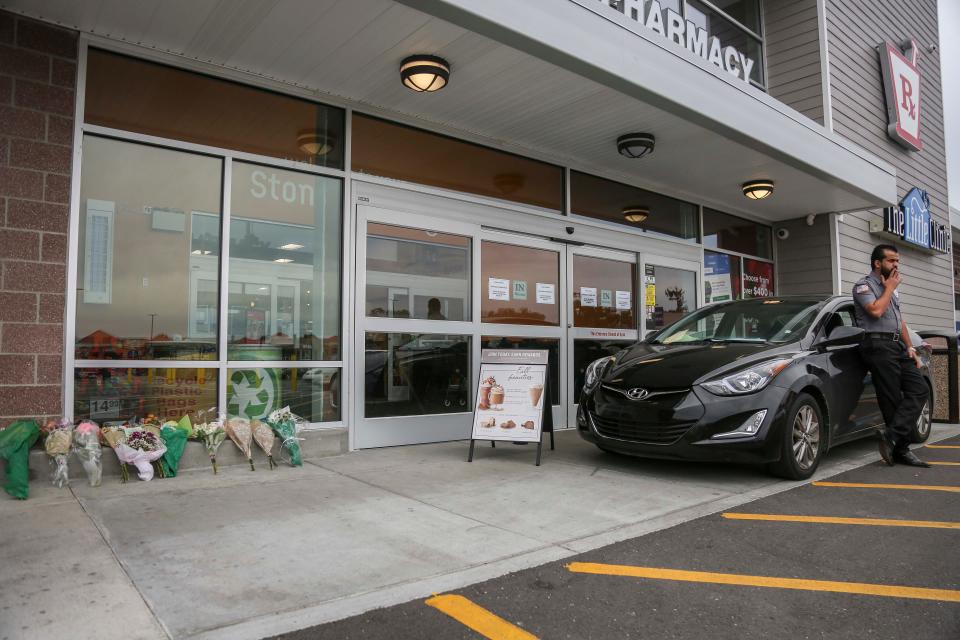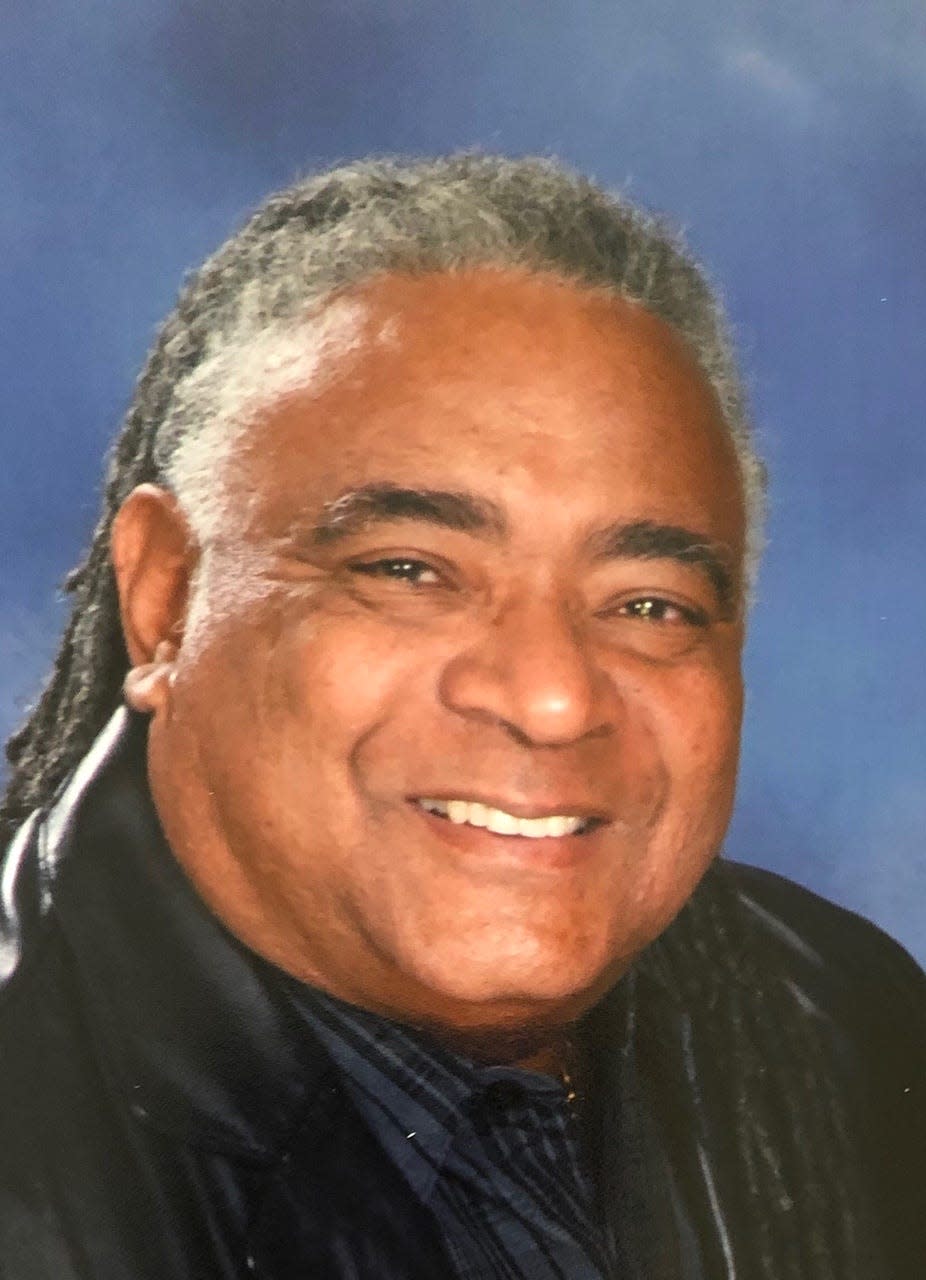Should Walmart, Kroger and other retailers ban carrying guns in stores?
After shootings at Walmart, Kroger, Waffle House, Macy's and others, are you comfortable shopping or visiting a business where patrons are permitted to bring their weapons?
Gun-rights advocates say allowing shoppers to carry guns permits them to defend themselves and others, while skeptics say it could add more danger and confusion at a crime scene.
On Aug. 3, a gunman stormed a Walmart in El Paso, Texas, killing 22.
Four days later, the widow of a man shot to death in a Louisville, Kentucky, Kroger supermarket is suing the retailer, claiming it didn't do enough to prevent his murder.
The lawsuit against Kroger also brings to light a multitude of largely ignored victims from more than two dozen shootings – most in the past seven years.
Rocked by two mass shootings in El Paso and Dayton, Ohio, this month that killed more than 30 people, Americans are again debating gun-control measures.
Walmart employee walkout: Some employees call on Walmart to stop selling guns in wake of mass shootings
Are video games to blame?: Video game industry pushes back on Trump's violence link, stresses parental tools

But mostly silent on the issue are major retailers that have the authority to restrict guns on their private property but don't.
The Enquirer, which is part of the USA TODAY Network, contacted a dozen of the nation's top retailers about their policies; only one responded.
This is despite the fact that nearly half of mass shootings (45.6%) occur in business settings, according to the Federal Bureau of Investigation.
This month's carnage marks nearly 40 incidents in retail establishments and other businesses that have killed or wounded almost 600 people in nearly a decade and a half, according to a database by the Associated Press, USA Today and Northeastern University. The database tracks all U.S. mass homicides since 2006 with at least four victims within a 24-hour period regardless of weapon.
Kroger's gun policy challenged in court
Cincinnati-based Kroger's policy, like many retailers, is to follow local and state laws on whether to permit gun owners to carry a firearm slung over their shoulder or holstered on a hip.
In states such as Ohio and Kentucky that don't explicitly ban the open carry of firearms, it's up to the property owner to establish what's permissible in stores.
A lawsuit filed Aug. 7 by Charlotte Stallard in Jefferson Circuit Court in Louisville singles out Kroger's "open carry" policy as a contributing factor in her late husband Maurice Stallard's death. It also said store security made no attempt to prevent the shooting and has no policy to ensure someone with a gun is legally permitted to have firearms.
The lawsuit claims Kroger was negligent considering 25 shootings since 1991 have taken place at its stores – all but two occurred since 2012.
One of those shootings happened in 2007 at the same Kroger store where Stallard was murdered. Besides Stallard, there were seven shootings at other stores that killed eight people.
"Kroger permitted customers to carry firearms inside its stores and elsewhere on the property. No effort was made to prevent (Stallard's alleged murderer) Gregory Alan Bush from bringing a loaded firearm into the Kroger store," the lawsuit says.
Kroger officials declined to comment on the lawsuit, but extended their "deepest sympathies to the families affected by this senseless violence." They ignored multiple requests to discuss their open carry policy.
Gregory Alan Bush, 51, of Louisville, is awaiting trial in Kentucky on state murder charges, pending a judge's competency ruling and also faces trial on federal hate crime and weapons charges.
On Oct. 24, Bush entered a Louisville-area Kroger, apparently seeking black victims to shoot. Before going to the supermarket, he attempted to enter a predominately African-American church.
Bush is accused of shooting Stallard, 69, in front of his grandson in the stationery aisle as the two shopped for supplies for the youngster's school project, according to court documents.

Outside, Bush allegedly shot another African American victim, Vickie Lee Jones, 67, in the parking lot as he left the store.
In the parking lot, Bush encountered two armed bystanders, one (who was African American) exchanged shots with him (no one was injured). The other confronted Bush who said: "I won't shoot you. Whites don't shoot whites," before speeding away in a car, according to the Louisville Courier-Journal.
Kroger, like many retailers, has faced pressure from both sides of the gun debate. Last year, it exited the gun business entirely when it stopped selling firearms at its Fred Meyer stores that sell both food and general merchandise.
But over the years, Kroger has stuck by its deference to state and local laws with regard to open carry.
Phil Cook, a public policy and economics professor at Duke University, say Kroger and other retailers are faced with a balancing act between customers' conflicting beliefs –including how to best maintain safety.
"Customers are going to want to feel safe," Cook said.
While Walmart has been threatened by a walkout by its own employees because it continues to sell guns, the retailer has restricted its gun policies this year to allay customer concerns.
In July, Walmart dropped gun sales in Utah stores due to a new state law that would have required the retailer to run background checks for customers selling firearms to other buyers. Walmart balked at the prospect of customers bringing their guns into stores for gun for non-Walmart gun sales.
"Walmart customers do not generally expect to see individuals walking through the store potentially carrying multiple firearms, which can lead to confusion and potentially putting both our customers and associates at risk,” a Walmart spokesperson told a local TV station.
Mass shootings have struck other retailers
The Walmart shooting in El Paso is the deadliest mass killing in 2019 (the shooting at a Dayton entertainment district was the third-deadliest), but so far, Walmart and other retailers are promising no changes to their gun policies.
But several retailers across America have been affected by mass shootings, including:
• Earlier this year, a gunman walked into a SunTrust Bank and killed five people in Sebring, Florida. The suspect in the shooting, Zephen Xaver, 21, had recently moved to Florida to live with his mother and resigned as a corrections officer a few weeks before the incident. A SWAT team was sent to the bank, and Xaver eventually surrendered.
• In 2018, four people were killed in a Waffle House in Nashville. The suspect in that shooting, Travis Reinking, 30, sprayed bullets from an assault rifle while he was naked except for a green bomber jacket. He was arrested following a 34-hour manhunt.
• Five were killed in a Burlington, Washington, Macy's shooting in 2016. Arcan Cetin, 20, an immigrant from Turkey and fast food worker, killed five at the Cascade Mall in Burlington, Washington. A year after being arrested, Cetin hanged himself in his cell.
• Then-Arizona Rep. Gabrielle Giffords became a staunch gun-control advocate after she survived a 2011 shooting at a Safeway supermarket near Tucson that killed six. Jared Loughner, then 22, went to an event for Giffords and shot her and constituents waiting to speak with her. Six died and 13 others, including Giffords, were hurt. Loughner pleaded guilty in 2013 to avoid the death penalty.
The Enquirer contacted more than a dozen top U.S. retailers this week to ask about their open carry policies, but so far only Walgreens has responded.
"Our policies are designed to provide a safe environment for our customers and team members," Walgreens said in a statement, noting it prohibits workers from bringing weapons.
As for customers, Walgreens said: "Our store policies for customers comply with the applicable laws and regulations in each location."
Walmart, Kroger, Costco, Home Depot, CVS, Target, McDonald's, Starbucks, Chipotle, Wendy's and Yum Brands (the parent company of Pizza Hut, KFC and Taco Bell) did not respond to queries about their open carry or gun policies.
Only five states prohibit the open carrying of handguns: California, Florida, Illinois, New York and South Carolina. Four generally prohibit long guns: California, Florida, Illinois and Massachusetts. The District of Columbia generally prohibits both.
Read @NRA's statement here: pic.twitter.com/Yl7xp8cefU
— NRA (@NRA) August 4, 2019
Gun advocates, such as the National Rifle Association, criticized "politicizing" the latest carnage, pledging to "pursue real solutions that protect us all from people who commit these horrific acts."
They did not specifically address open carry policies, nor return messages seeking commentary on the subject.
Laura Cutilletta, a spokeswoman for the Giffords Law Center to Prevent Gun Violence in San Francisco, said most retailers cop-out on their gun policies, seeking to avoid the polarizing debate.
States and municipalities that don't ban the open carrying of firearms leave it up to property owners to forbid weapons, but most retailers don't exercise that right.
"It's nonsensical – that's what it means to own property," she said. "Having private property permits the owner to decide what happens on that property."
Follow Alexander Coolidge on Twitter: @alexcoolidge
This article originally appeared on Cincinnati Enquirer: Mass shootings: Should Walmart, Kroger ban carrying guns in stores?
